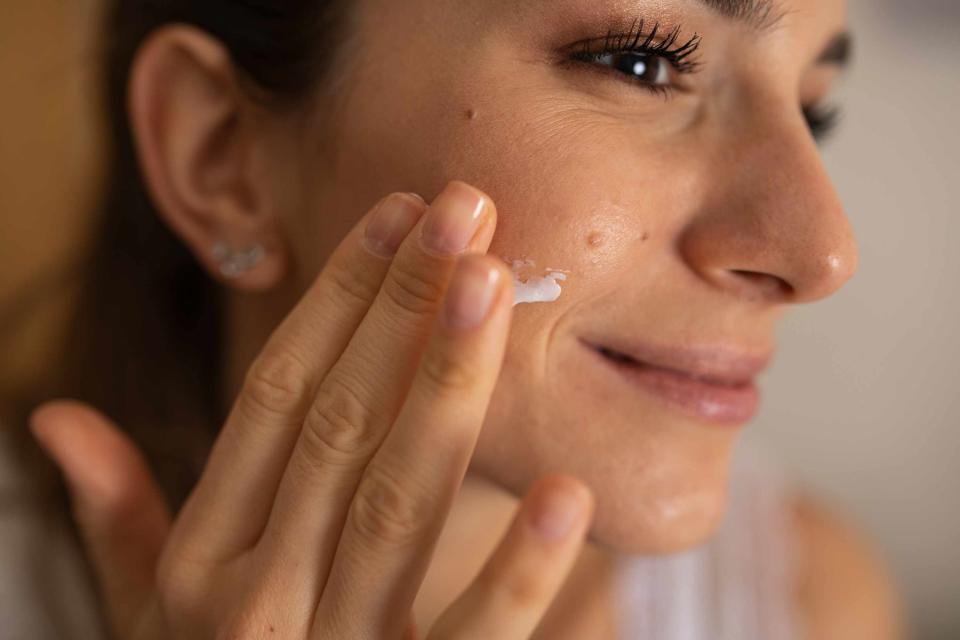4 Skincare Benefits of Hyaluronic You Need to Know to Glow
Experts weigh in on whether the skincare superstar is really as good for your skin as people say.

Getty Images
Whether you’re a self-proclaimed skin enthusiast or just building a real skincare routine for the first time, there are some ingredients that virtually everyone knows and loves and have proven themselves as staples that transcend fleeting trends. One such powerhouse is hyaluronic acid—a seemingly magical substance praised for its hydrating capabilities, amongst other things. But what truly makes it so sought after? Spoiler: it’s about more than just moisture.
Far from a one-trick pony, hyaluronic acid’s compatibility with various skin types and its synergistic relationship with other ingredients cements its place as a must-have in any skincare regimen. In this article, we’ll explore hyaluronic acid’s unique attributes and full potential as a star in your skincare routine. Let's delve deeper into the science behind hyaluronic acid and uncover the myriad of benefits it offers for radiant, healthy skin. Glow on and take notes!
What is Hyaluronic Acid?
As board-certified dermatologist Andrea Suarez, MD, FAAD, aka Dr. Dray on YouTube, explains, "Hyaluronic acid is a humectant, which means it helps attract and retain moisture. Hyaluronic acid helps improve the moisture content of the outermost layer of the skin, resulting in hydrated, smoother skin." While this key benefit may be most attractive to those with dry skin, it’s important to note that all skin types require hydration, aka water. As a quick refresher, the human body is generally made of up to 60% water, and your skin is the largest organ in your body—meaning it needs a proper daily dose of hydration for optimal performance.
Hyaluronic Acid in Skincare Products
Beyond its natural presence in our bodies, hyaluronic acid, of course, has its place in skincare products. It's a standout ingredient in everything from serums to moisturizers and masks. When browsing the skincare aisle, you'll encounter various forms of hyaluronic acid, such as sodium hyaluronate and hydrolyzed hyaluronic acid. Dr. Dray clarifies that these variations represent different molecule sizes, each crafted to target distinct skin layers.
“Hyaluronic acid in its raw form is pretty large and therefore remains at the skin surface. Hydrolyzed hyaluronic acid is hyaluronic acid split into smaller fragments so it more readily penetrates the skin. Sodium hyaluronate is the salt of hyaluronic acid and has improved stability and bioavailability," explains Dr. Dray. Essentially, this means that each form of hyaluronic acid offers unique benefits and functions at different depths of the skin.
Related: The 14 Best Hyaluronic Acid Serums of 2023, Tested & Reviewed
Hydration and Moisture Retention
Undoubtedly, the most heralded benefit of hyaluronic acid is its unmatched hydration and moisture retention properties. This molecule acts like a sponge, absorbing and holding onto water molecules. For those unfamiliar with the term, "hydration" refers to the amount of water in the skin, while "moisture retention" pertains to the skin's ability to hold onto that water over time. Hyaluronic acid excels in both areas. Its unique molecular structure allows it to retain up to 1,000 times its weight in water.
Dr. Dray emphasizes the versatility of hyaluronic acid, saying, "Hyaluronic acid is great for all skin types to consider due to its hydrating properties." And yes—hydration is essential for oily skin, too, as it can help regulate oil production and prevent overcompensation, which leads to more oiliness. Moreover, maintaining well-hydrated skin can serve as a defense mechanism against environmental stressors like wind, cold air, and indoor heating—all of which can strip the skin of its natural moisture.
Reducing Fine Lines and Wrinkles
As Jordan Samuel Pacitti, esteemed esthetician and founder of Jordan Samuel Skin, previously told SHAPE, hyaluronic acid is like a "temporary plumping agent" for the skin, which can be attributed to helping skin retain moisture, filling the skin cells, making them appear fuller and giving the skin a smoother, more youthful appearance. When the top layers of the skin are hydrated, fine lines and wrinkles are less obvious," adds Dr. Dray. When your skin drinks up this hydrating hero, it plumps up, visibly smoothing out signs of aging. Additionally, Dr. Dray points out that the smoother complexion attributed to proper hydration may always reduce the visibility of pores.
Soothing and Calming Properties
In addition to being tolerable by even sensitive skin, studies show that low molecular weight hyaluronic acid also has anti-inflammatory properties. Furthermore, by maintaining a healthy hydration level, hyaluronic acid helps fortify the skin's natural barrier, ensuring it’s able to protect itself against potential aggressors.
Related: The 8 Best Foods for Glowing Skin, According to Dietitians
Compatibility with Other Skincare Ingredients
If you're contemplating integrating hyaluronic acid into your beauty arsenal, Dr. Dray has some guidance. She suggests applying hyaluronic acid post-cleansing and recommends her personal favorite, Neutrogena Hydro Boost Water Gel which blends hyaluronic acid with other moisturizing agents. Most importantly, she highlights the versatility of hyaluronic acid—it can harmoniously coexist with a plethora of ingredients, from the potent retinol to the brightening vitamin C.
But there's an additional perk. Hyaluronic acid can amplify the efficacy of other skincare products. "Hyaluronic acid can enhance the penetration of some of your other skincare ingredients," Dr. Dray notes. This means potentially heightened results but also a need for caution. Enhanced penetration might also intensify skin reactions, so it's crucial to stay attuned to your skin's feedback.
Whether you're looking to quench thirsty skin or temporarily plump out a few lifelines, hyaluronic acid has got you covered. Remember, it's not just about having it in your routine —it's about using it wisely and remaining consistent.
Related: The Shape 2023 Skin Awards
For more Shape news, make sure to sign up for our newsletter!
Read the original article on Shape.

